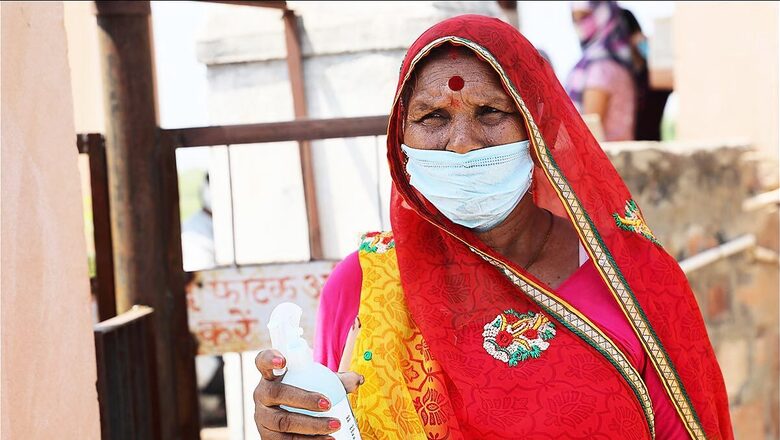
views
When we think about disease prevention, we often (correctly!) pay attention to nutrition, access to medical care, and lately, social distancing. Of course, we also pay attention to personal hygiene. Hygiene at a community level, known as sanitation, plays just as important a role.
miss However, sanitation is often neglected and underfunded, especially in low- and middle-income countries, where millions of people lack access to basic services such as toilets, waste collection, and wastewater treatment.
Among those who work to provide and maintain sanitation services, women are often invisible and undervalued. Women sanitation workers face multiple challenges, such as discrimination, harassment, low wages, poor working conditions, and health risks. Yet, they play a vital role in safeguarding public health and sanitation, and this was especially true during the COVID-19 pandemic.
The Contributions Of The Unseen Labour Force
Waste Management and Disease Prevention: Women sanitation workers play a pivotal role in waste management, collecting and disposing of garbage, sewage, and other waste materials. By doing so, they prevent the buildup of trash and sewage that can serve as breeding grounds for disease-causing organisms.
- Preventing Waterborne Diseases: By ensuring that sewage systems are clean and functional, sanitation workers help protect entire communities from waterborne diseases like cholera and typhoid.
- Controlling Vector-Borne Diseases: Waste, when not managed correctly, can attract disease vectors like flies and rats. These vectors can carry diseases such as dengue and leptospirosis.
- Reducing Respiratory Infections: Dust and pollution from unswept streets can contribute to respiratory infections. By keeping public areas clean, sanitation workers help reduce the risk of respiratory illnesses.
- Promoting Personal Hygiene: Public toilets, when clean and accessible, encourage people to practise good personal hygiene. This, in turn, reduces the spread of diseases.
Maintaining Clean and Hygienic Public Spaces: These dedicated workers ensure that public spaces, including streets, parks, and markets, remain clean and hygienic. By doing so, they create an environment that is less conducive to the spread of diseases and vermin. Cleaner public spaces encourage healthier habits among the community, like regular hand washing and responsible waste disposal.
Safe Disposal of Hazardous Materials: Apart from household waste, women sanitation workers are responsible for handling hazardous materials, including medical waste and chemical substances. Their proper disposal of these materials is crucial in preventing contamination of water sources and the environment, in turn, protecting the wider community from exposure to harmful substances.
Community Education and Awareness: Many women sanitation workers actively engage with the community, educating residents about the importance of sanitation and proper waste disposal. Their presence helps raise awareness about hygiene practices and encourages people to adopt responsible habits, such as segregating waste and recycling. This education not only improves public health but also fosters a sense of community responsibility.
Breaking Stereotypes and Empowering Women: The role of women sanitation workers challenges traditional gender norms and empowers women to pursue careers in fields traditionally dominated by men. Their mere presence opens doors to other women. This empowerment has far-reaching effects on the overall well-being of women and their communities.
Environmental Stewardship: In addition to safeguarding public health, women sanitation workers also contribute to environmental sustainability. Their efforts reduce pollution, minimise landfill waste, and support recycling initiatives. By doing so, they play a vital role in preserving natural resources and mitigating the effects of climate change.
Empowering Women Sanitation Workers
While these women provide an essential public service meeting a critical societal need, their own needs are often left unmet. Particularly in the unorganised sector, these women often work in hazardous conditions and with very low pay. The conduct of their employers is often dehumanising – stories abound where these women have been denied access to drinking water, because the work that they do is perceived as ‘dirty’ work. Caste based discrimination also plays a role.
As India’s leading brand in the lavatory care space, Harpic has a keen understanding of the problems that sanitation workers face. Harpic World Toilet College (HWTC) was established with the stated objective of improving the quality of life of sanitation workers through their rehabilitation by linking them with dignified livelihood options. Workers trained by the college are provided placement with various organisations. Following the successful proof of concept in Rishikesh, HWTCs have opened in Maharashtra, Aurangabad, in partnership with Harpic, Jagran Pehel and Maharashtra Government.
When these women graduate from HWTC, they emerge as certified sanitation professionals. No longer do they see their work as ‘dirty work’ or themselves as ‘unskilled labour’. They understand the risks their work poses to their health and that of their families, and have the soft skills needed to have these conversations with their employers in a productive way. They are able to articulate why they need protective gear and tools, and if those aren’t available, they have the confidence to pursue jobs where they are.
As the HWTC also undertakes placements, most graduates emerge with jobs in the organised sector – with better pay, a provident fund, and insurance. They now have job security, and that security gives them a firmer footing in the world. Between better pay and insurance, they have the confidence to both save for a rainy day, and spend on the things they need to improve their circumstances.
To say it is a life changing experience is an understatement.
Of course, the establishment of HWTC is just one part of the larger program to build awareness around toilet access, toilet hygiene, and the upliftment of the sanitation workers who form the backbone of our sanitation efforts. Three years ago, Harpic joined hands with News18 to create Mission Swachhta aur Paani, a movement that champions the cause of inclusive sanitation, equality for all genders, abilities, castes and classes and the strong belief that clean toilets are a shared responsibility.
Mission Swachhta aur Paani is using its platform to spark the right conversations between elected officials, municipalities, NGOs, activists, sanitation workers and members of the public. These conversations are aimed at finding local, grassroot solutions that work.
Moreover, Mission Swachhta aur Paani leverages News18’s large reach to bring these stories to a larger audience. The more we know, the greater our awareness, the more carefully we step through the world. If even a single person reading this article is able to feel gratitude and respect for the work that their local sanitation worker does, we’ve moved the needle.
Join us here, to play your part in this national transformation.




















Comments
0 comment